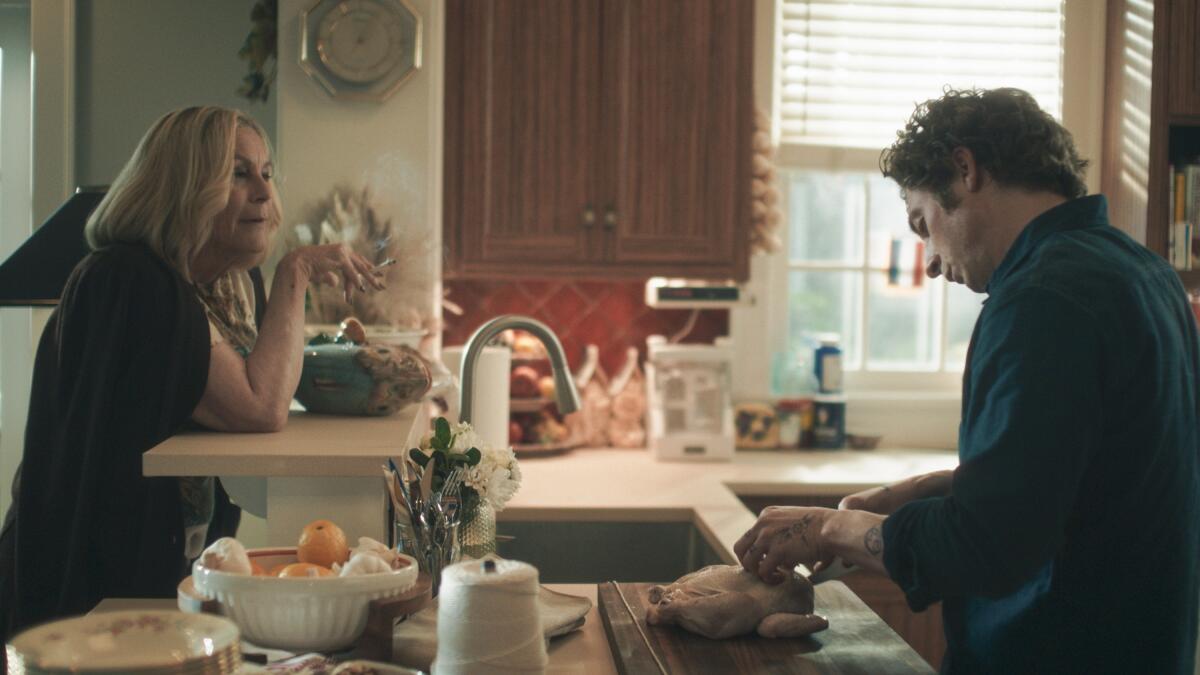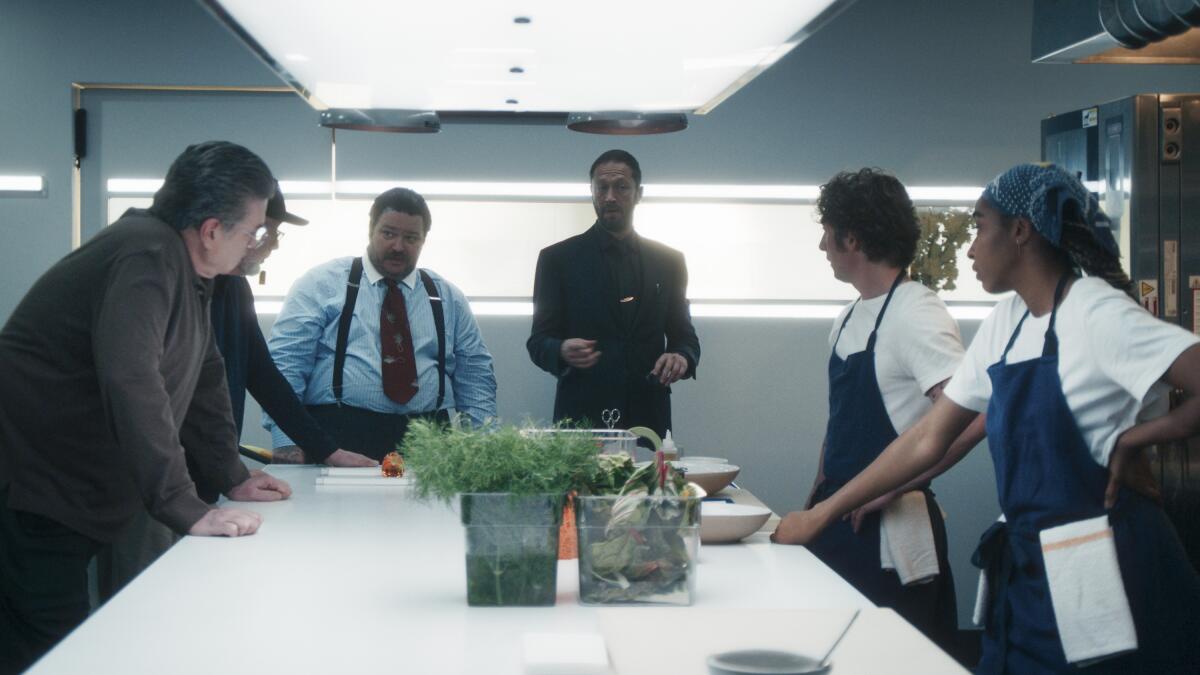To start with there was chaos.
Three years in the past, FX’s “The Bear” splattered throughout our screens and made it not possible to look away. The yelling; the cursing; the gravy-slopping, bowl-clattering, grease-slick, jerry-rigged anxious sweaty mess of the Chicago sandwich store the Beef and the wildly dysfunctional group of people that labored there, together with elite chef Carmy Berzatto (Jeremy Allen White), who inherited the Beef from his dead-by-suicide beloved brother Mikey (Jon Bernthal), wowed critics and raised the tradition’s collective cortisol depend to eye-twitching ranges.
Critics used phrases like “stress bomb” and “adrenaline shot”; present and former restaurant staff described signs not not like these of PTSD, and viewers ate all of it up with a spoon.
Season 2, wherein Carmy follows by on his plan to show the Beef right into a fine-dining institution, solely elevated the nervousness degree. With actual cash on the desk (courtesy of Carmy’s uncle Jimmy, performed by Oliver Platt), together with the hopes, goals {and professional} futures of the workers, together with Sydney (Ayo Edebiri), Marcus (Lionel Boyce), Tina (Liza Colón-Zayas), Sugar (Abby Elliott) and, in fact, Cousin Richie (Ebon Moss-Bachrach), stakes had been cranked to do-or-die.
When the episode “Fishes,” a stomach-clenching vacation buffet of trauma, revealed the twisted roots of a household solid by alcoholism — Carmy’s mom Donna (Jamie Lee Curtis) — and abandonment — Carmy’s father — viewers couldn’t get sufficient.
This being tv, we knew that every one the wild dysfunction would inevitably coalesce into triumph — you can’t obtain greatness with out driving your self and everybody else loopy first, proper? When, on the finish of Season 2, the Bear one way or the other managed to have a profitable opening evening, regardless of Carmy locking himself in a fridge and having a full-on existential disaster, our deep attachment to “yes chef” pandemonium appeared vindicated. Fistfuls of Emmys and dopamine cocktails throughout.
Besides with the ability to open is a slightly low bar for achievement, even within the restaurant enterprise. Carmy is, for all his expertise, an utter mess, and creator Christopher Storer will not be, because it seems, serious about celebrating the time-honored, and albeit poisonous, notion that insanity is a crucial a part of genius — to the obvious dismay of many viewers.
When, in Season 3, Storer and his writers opted to sluggish issues down a bit, to drag every character apart and unsnarl the welter of feelings that fueled the Bear’s kitchen, some viewers had been disenchanted. Which, having turn into depending on the present’s stress-bomb vitality, they expressed with outrage. “The Bear” had misplaced its edge, was getting boring, boring, repetitive and reliant on stunt-casting; it ought to have ended with Season 2 or, higher but, turn into a film.
Season 4 of “The Bear” begins with the restaurant’s crew response to the Chicago Tribune evaluation and the way it will have an effect on the restaurant. “They didn’t like the chaos,” Sydney says.
(FX)
Seems that Carmy’s obsessive willpower to vary the menu day by day, and preserve his workers on perpetual tenterhooks, was perceived as disruptive, however not in a great way.
“They didn’t like the vibe,” he tells Syd in a morning-after debrief. “They didn’t like the chaos,” she replies. “You think I like chaos?” he asks. “I think you think you need it to be talented,” she says, including, “You would be just as good, you would be great … without this need for, like, mess.”
Coming early in Episode 1, Syd’s message is a bit on the nostril, however dependancy doesn’t reply to subtlety, and “The Bear” is, as I’ve written earlier than, all in regards to the perils and long-range injury of dependancy. That features Donna’s to alcohol, Mikey’s to painkillers, Carmy’s to a self-flagellating notion of perfection and, maybe, the fashionable TV viewers’s to cortisol.
As Season 4 performs out, with its emphasis on introspection and actual connection, viewers may take into account why “addictive” has turn into the best type of praise in tv.
It’s such a sneaky bastard, dependancy, pleased to hijack your mind chemistry in any manner it might probably. Our collective consideration span isn’t what it was once and the adrenaline rush unleashed by disaster, actual or noticed, can create a want to maintain replicating it. Even on broadcast and cable tv, most dysfunctional household collection take a one-step-forward-two-steps-back method to their characters’ emotional progress. The mess is what viewers come for, in spite of everything.
Notably in comedy, we wish to see our characters get into jams for the pleasure of watching them wildly flail about making an attempt to get out of them. Early seasons of “The Bear” took that want to a complete new degree.
However having amped up the craziness and the stakes, Storer now seems to be extra serious about exploring why so many individuals consider that an ever-roiling crucible is important to attain greatness. And he’s keen to dismantle a few of the very issues that made his present a giant hit to do it.
Frankly, that’s as edgy because it will get, particularly in streaming, which more and more makes use of episodic cliffhangers to hurry up a collection’ completion fee — nothing fuels a binge watch like a jacked up coronary heart fee.
Like Carmy, Storer doesn’t seem content material with resting on his laurels; he’s keen to take counterintuitive dangers. As an try to really present each the need and problem of restoration, in a micro- and meta- sense, “The Bear” is an experiment that defies comparability.
At the start of this season, Uncle Jimmy places a literal clock on how lengthy the Bear has earlier than, wanting a miracle, he must pull the plug. Carmy, nonetheless hooked on drama, claims they’ll nonetheless get a Michelin star, regardless of proof on the contrary, which is able to remedy all the pieces. (Spoiler: A gun launched within the first act should go off within the third is one among many tropes “The Bear” upends.)
The remainder of the workers, mercifully, takes a extra pragmatic method. Richie, having turn into the sudden sensei of the Bear (and the present), does essentially the most wise factor — he asks for assist from the crackerjack workers of chef Terry’s (Olivia Colman) now defunct Ever. Watching chef Jessica (Sarah Ramos) whip the nightly schedule into form solely underlines the absurdity, and injury, of the auteur idea of something — greatness is rarely a solitary achievement.
As Carmy loosens his grip, different outsiders pitch in — Luca (Will Poulter) exhibits up from Copenhagen to assist Marcus and likewise winds up aiding Tina; Ebraheim (Edwin Lee Gibson) drafts an precise mentor (performed by Rob Reiner) to assist him work out how he can develop the Beef sandwich window and Sweeps (Corey Hendrix) finds his personal in one other sommelier (performed by retired grasp Alpana Singh).

Donna (Jaime Lee Curtis) apologizes to Carmy (Jeremy Allen White) for her actions and the hurt she brought on.
(FX)
Carmy, thank God, not solely returns to Al Anon, however he lastly visits his mom, which permits a now-sober Donna (in one other probably Emmy-winning efficiency by Curtis) to confess the hurt she has performed and attempt to make amends.
It’s, inarguably, a really totally different present than the one which debuted three years in the past, with far fewer cacophonous kitchen scenes, and plenty of extra Chicago-appreciating exteriors. When the long-awaited marriage ceremony of Richie’s ex, Tiffany (Gillian Jacobs), reunites lots of the characters from the well-known “Fishes” episode, fears a few gathering of Berzattos and Faks show unfounded. Regardless of a high-pitched and hilarious spat between Sugar and her ex-bestie Francie Fak (Brie Larson), the occasion is, as an alternative, a celebration of affection and reconciliation and contains what passes for a bunch remedy session underneath the desk the place Richie’s daughter Eva (Annabelle Toomey) has hidden herself. (This scene, which concerned all the principle characters, was greater than somewhat undermined by mentioned desk’s TARDIS-like skill to be “bigger on the inside” and the truth that it held the marriage cake, which didn’t fall as all of them exited, is proof that “The Bear” will not be a comedy.)
Not even the digital countdown might generate the scorching, clanking, sniping roar of persistent, natural nervousness that fueled the primary two seasons. And I’d be mendacity if I mentioned I didn’t miss it — I really like my adrenaline rush as a lot as the following particular person.
However that’s the entire level. Actual change doesn’t happen with the velocity or the electrical energy of a lightning bolt; as many addicts uncover, it’s about progress, not perfection. Restoration takes time and infrequently feels bizarre — if you wish to have a special kind of life, it’s essential do issues in a different way.
That’s powerful on a success TV present, because the reactions to Season 3 proved (we’ll see the way it fares when Emmy nominations are introduced in just a few weeks). Few collection have made as massive a shift in tone and tempo as “The Bear,” however its intentions are clear. To light up the need, and problem, of breaking an dependancy to something, together with, chaos, you possibly can’t depend on speak; you life to be totally different, you must do issues in a different way.


